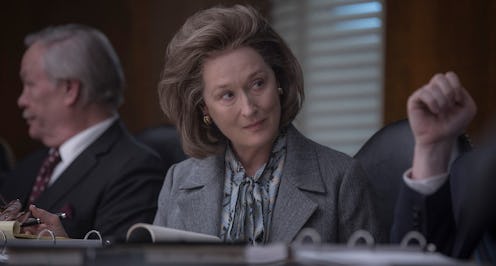Entertainment
What Meryl Streep's Character In 'The Post' Can Teach Women About Speaking Up At Work Today

On the surface, Steven Spielberg's latest film The Post is a serious historical drama covering the 1971 exposure of the controversial Pentagon Papers by reporters at The New York Times and The Washington Post. Much like Spielberg's other films dealing with dramatic true events, The Post makes the magnitude of its subject matter evident, particularly in relation to press freedom, government cover-ups, and more. But while The Post excellently treads into that weighty territory, the heart of the film is a feminist story about Katharine "Kay" Graham, the publisher and owner of the titular paper. And as The Post's screenwriters, Liz Hannah and Josh Singer, make clear, the movie is much less about the papers themselves and far more about a woman learning to speak out with confidence in a male-dominated world.
"I wanted to tell the story of a woman finding her voice," Hannah says about beginning the script in summer 2016, when we speak on the phone. "We often see films that show women in positions of power that are already in power; they're strong women and that’s wonderful. But there is something so relatable and so universal about seeing a woman who isn’t empowered yet, who’s struggling to find her power, who’s struggling to find her voice, who’s dealing with her insecurities, who’s feeling the idea that she may not ever be enough."
After reading Graham's memoir, Hannah was inspired to revisit an era she had only heard about as a child. "[Graham's] reflection on her life was so honest," Hannah says. "She had this very unique way of being vulnerable, but not victimizing herself and was so honest about her insecurities and her mistakes and choices she’s made." This discovery led to Hannah writing her script, which was swiftly purchased in winter 2016 by producer Amy Pascal and put into production. Singer, who won an Oscar for writing the Best Picture-winer Spotlight, was brought in for finalizations.
Graham's entire life could be fodder for movies, but Hannah and Singer focused on her leadership over the Post during a time when many of her male colleagues believed she wasn't capable of holding the job. Graham had inherited the paper after her husband's death, and being the female head of a major newspaper in 1971 meant she was often the only woman in the room and the subject of sexist criticism, as The Post portrays. When presented with the Pentagon Papers, which detailed the U.S. government's failed policies leading up to and during the Vietnam War, Graham was tasked with deciding whether to publish the truth or face the wrath of the Nixon administration. It was her choice alone, but she faced intense pressure on both sides and waffled in her decision.
"The thing that we felt very strongly about was that the story about a woman finding her voice is not just relevant to 2017," Hannah says. "It was just as relevant in 2016, 2001, and 1992, and 1971." The idea of a woman being alone in a board room full of men, or of a woman being in charge and still not being heard by the men that work for her — "those are things that are universal to women around the world," the writer continues.
Luckily, Graham's story got to be portrayed by none other than Meryl Streep, a vocal champion of equal rights. The screenwriters say they couldn't have been happier with the choice. "When you’re writing about Katherine Graham and you have Meryl Streep playing her, the power of women kind of comes to the forefront," Hannah says. "Because those are two forces to be reckoned with. Meryl still is."
Indeed, Streep has been outspoken about a number of feminist issues, from pay equality to the ongoing sexual misconduct allegations. But even Streep's passionate takedowns of sexism point out that, with the over 40 decades of progression that this country has embraced, we still have a long way to go.
In addition to telling the story of woman coming into her own, Hannah and Singer's film also holds a mirror up to current events, tackling issues such as freedom of the press and presidential scandals. "It was very strange to listen to [the Nixon tapes] and hear the similar antagonistic approach to the press, and the paranoia," Hannah says, referencing the Trump administration's press restrictions. "That was very eerie to listen to."
Reading the incredibly dense Pentagon Papers, listening to Nixon's tapes, and diving into the details made both writers angry, they say. But Hannah and Singer insist that The Post doesn't fall on either line of the political divide, considering that it also skewers the policies of more progressive presidents like Kennedy and Johnson. "Here's the thing," Singer says, "Presidents lie. And Democratic presidents lie. Bill Clinton, LBJ, JFK, I’m sure Obama even told a couple whoppers. Presidents lie and we need a strong institutional press to hold those leaders accountable."
"History for better or for worse is cyclical," Hannah adds. "The pendulum swings, and it's important to look back on history and see what happened, see how people reacted, see what we did, see how we came together and maybe learn something from that and take it with us when it potentially happens again."
It's hard to know exactly what we've learned since the '70s, but it's looking likely that we're in for more potential scandals, societal overhauls, and miniature revolutions. And with such news, the press must be ever vigilant, determined, and downright ballsy. Not every paper or news outlet these days has someone with the guts that Katharine Graham had, but they'd all be better off if they did.